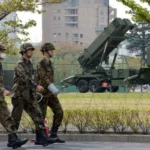
In a seismic shift that sends ripples through the intricate tapestry of East Asian geopolitics, Japan has embarked on an unprecedented maneuver—greenlighting the export of Patriot missiles to the United States. This decision, fraught with geopolitical import, transcends the customary norms that have long characterized Japan’s postwar defense policies.
Departure from Tradition
Japan, historically ensconced in pacifism, has been distinguished by stringent controls on arms exports. This deviation from tradition marks a pivotal juncture in the nation’s defense strategy. The choice to export Patriot missiles, advanced weaponry laden with implications extending beyond its physical payload, reflects a strategic reevaluation of Japan’s role in the labyrinthine realm of regional security.
Genesis of Change
The genesis of this transformative decision lies in the evolving geopolitical landscape of East Asia. Amidst escalating tensions in the region, particularly concerning the military postures of neighboring countries, Japan finds itself at a crossroads. The decision to permit the export of Patriot missiles signifies a proactive approach to addressing emerging security threats, notably from China and North Korea.
Strengthening US-Japan Relations
Central to this unprecedented move is the fortification of the enduring alliance between Japan and the United States. The green light for exporting Patriot missiles is not merely a transaction; it is a testament to the mutual trust and cooperation defining the relationship between these two nations. The move underscores the strategic importance of their partnership in maintaining regional stability and countering shared security threats.
Shift in Defense Policy

The decision to relax arms export controls is not an isolated event but part of a broader shift in Japan’s defense policy. Concurrent with this move, Japan’s Cabinet has sanctioned a record $56 billion military budget, a clear indicator of the government’s commitment to modernizing its armed forces. This financial infusion is poised to accelerate the development of cutting-edge defense capabilities, bolstering Japan’s position as a formidable player in the regional security landscape.
Unveiling the Patriot Missiles
The focal point of this groundbreaking move is the Patriot missiles, a sophisticated surface-to-air missile system with a storied history. Crafted by the United States, the Patriot system has been a linchpin of modern air defense, renowned for its versatility and efficacy. Japan’s decision to export these missiles signifies not only a technological exchange but also a strategic alignment of defense capabilities between the two nations.
Domestic and International Perspectives
The decision has elicited a spectrum of reactions, both domestically and internationally. Within Japan, opinions span from steadfast support for bolstering national defense to apprehensions about the potential repercussions of increased militarization. On the global stage, this move is poised to be a focal point of diplomatic discussions, with repercussions for arms control and non-proliferation dialogues.
Context of Regional Security
The timing of Japan’s decision is critical, given the multifaceted challenges confronting East Asia. Regional security concerns, fueled by geopolitical maneuvers and territorial disputes, have created an environment where nations are reassessing their defense postures. Japan’s move is not isolated; it is a response to a broader context of changing power dynamics in the region.
Economic Ramifications
Beyond the geopolitical ramifications, Japan’s entry into the international arms market has economic dimensions. As a major economic powerhouse, Japan’s venture into arms exports could reshape existing dynamics. The international arms trade, already a complex and contentious arena, is poised to witness shifts with Japan’s participation.
Historical Context: A Major Revision Since 2014
To comprehend the gravity of this decision, it is imperative to contextualize it within Japan’s historical approach to arms exports. This move marks the first major revision of Japan’s arms export ban since 2014. The decision at that time had already signaled a departure from strict postwar policies. The current move is a continuation of that evolution, addressing contemporary security challenges.
Global Stage: A Ripple Effect?
Japan’s decision to export Patriot missiles may have broader implications for the global arms trade landscape. As a nation with advanced technological capabilities, Japan’s entry into the international arms market could influence the behavior of other nations. The diplomatic fallout or support garnered by Japan will be closely observed, potentially setting off a ripple effect in global defense strategies.
Navigating Uncharted Waters

Japan‘s decision to permit the export of Patriot missiles to the United States is a historic juncture with multifaceted implications. It is a departure from tradition, a strategic realignment, and a response to the complex challenges facing East Asia. As the international community grapples with the repercussions of this move, questions about its long-term impact on global geopolitics and regional security persist. Japan, once again, finds itself navigating uncharted waters, redefining its role in a rapidly evolving world.










